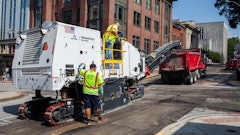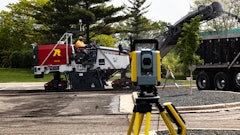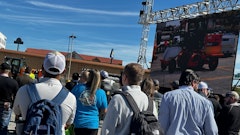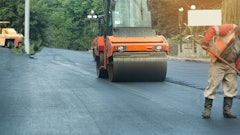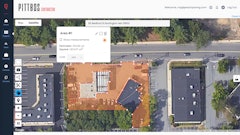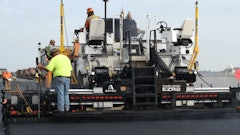
The laborer on every paving crew is an entry level position, designed as a stepping stone to move an employee up to other positions in the paving crew. But don't make the mistake of thinking that because it's an entry level job that it's an unimportant job. On the contrary, no paving crew can operate efficiently and effectively without one or more quality laborers.
Now why is that? What is an entry level, unskilled (at the start) worker going to contribute that makes him (or her) so essential to the success of a paving crew?
Assistance.
That's right, the laborer on the crew is there to assist everyone else on the crew - plus do his own job. In some cases that means he's a "gofer," fetching whatever it is someone needs, but most often the laborer is there to handle small tasks that enable the other people on the crew - the paver operator, screed operator, roller operator, foreman - to focus on their own jobs.
He reports to the foreman and communicates (often negotiates) among the paver operator, the screed operator, and the roller operator. He assists in keeping all equipment fueled and watered, helps clean the paver and the roller, and he assists in greasing - all important tasks for each job but also important for the laborer as he learns the equipment and lays the groundwork for moving up to an operator position. He assists in lining up trucks as they wait to bring mix to the paver, and he assists the paver operator and truck driver in dumping mix into the paver, helping the paver connect to the truck without bumping and making sure the tailgate opens properly so mix is dumped smoothly and evenly, reducing the chance for segregation.
Shoveling, raking, luting
But just because one of a laborer's job descriptions reads "assist others as needed" doesn't mean he doesn't have his own job, responsibilities, and skill sets. First and possibly foremost is labor. He's going to be responsible for the lifting, heavy and otherwise, so the person applying to this job must be in good physical shape.
Days are long, weeks are longer, and hot mix asphalt doesn't get any lighter the more you push or lift it, so only sound physical specimens need apply. The reason he has to push, pull, and lift is because the laborer on a paving crew is usually responsible for maintaining the quality of the mat. If he sees a hole in the mat he gets a shovel of the correct amount of mix from the hopper and places it properly in the hole. He has to know when to fill a hole and when to rake or lute, and he needs to do it all quickly so the mat is ready when the roller operator comes along.
In addition to being physically capable of all that shoveling he has to know (or be willing to learn) proper shoveling technique (and yes, there is one). Proper technique involves bending the knees and putting a back into the shovel - all to prevent injury and to enable him to shovel all day long. Plus, he has to know (or learn) how to distribute the shovel full of material onto the mat so it doesn't segregate. Mix should be plopped onto the mat in a mass, almost as one piece; casting it broadly across the mat not only results in complete segregation but also can cause injury to the laborer.
As simple as this sounds most laborers don't distribute material properly, and many haven't figured out when to stop raking or luting, and the results can be seen in the poor quality of some finished mats.
Running support equipment
The laborer on a crew needs to be a versatile operator of much of the support equipment on the job. Other operators on a crew likely know how to operate the support equipment (after all, they were all laborers at some point) but the foreman doesn't want to stop paving so his screed man or roller operator can run the skid steer or jackhammer.
What equipment the laborer learns first depends on the crew, but the skid steer has certainly become one of the most important additions to paving crews. With the advent of so many attachments, ranging from buckets to brooms to saws and milling, skid steers are huge labor-saving machines that can keep workers from getting tired, speed production, and reduce handwork. So a successful laborer will know how to connect the attachments and their hydraulics, how to run the skid steer itself, and he'll become adept at working all the attachments. And the more skilled a laborer becomes on a skid steer the greater his job security, the broader his skill set, the greater his compensation, and the greater his value to the contractor.
In addition to the skid steer he'll need to learn how to use the jackhammer to cut joints and begin cutting remove-and-replace patches. If the contractor has a pavement saw the laborer will need to know how to line it up and saw a straight line. Handling a hand broom is an overlooked skill that's important, and operating wheeled or backpack blowers is a "must" skill too.
Additional responsibilities
Some pavers think the most important part of a laborer's job is when he arrives at the yard in the morning. It's then that he needs to make sure all the tools that will be needed for the day are ready to go and on the appropriate trucks heading out into the field. Tools he checks can include shovels, rakes, lutes, paint cans, markers, stringline, paint guns, plate compactor, brooms, blowers, and whatever else the contractor wants the laborer to be responsible for. It's also important a laborer keep a good putty knife in his pocket as he can use that to scrape the lutes, rakes, shovels, and even the ends of the screed as the day progresses.
Other basics include:
- Knowing which side of the paver to work on, moving to the other side when you need to
- Don't get hurt (so wear appropriate safety gear including hard hat, gloves, earplugs, glasses, steel toed shoes, and vests)
- Don't walk on the mat, whether base or surface course
And assist the foreman in collecting and organizing delivery slips from the truck drivers. As you collect these papers it's essential that you organize them in a clip board in the order of the paving passes. Why? Because if the foreman asks you where you're at on a 500-ton job and you look at the top sheet which says 350 tons, he's going to call the plant to order the remaining 150 tons. But if beneath your top sheet is the most recent delivery slip that indicates you're at 420 tons, you're going to be over on the job by 70 tons, and that's pure profit that's lost.
Finding, developing a laborer
To find quality laborers be on the lookout for hardworking, safety and quality-oriented people interested in making paving a career. When you present the job that way, as a career opportunity as opposed to menial labor, you should get some interest for longer-term work.
And there's more to the job than physical labor. The candidate must be quality oriented because his job is to maintain the mat. He (or she) has to be thorough, has to be able to monitor his own work for quality, and take responsibility for his own actions. Because he assists everyone else on the crew he must be a team player, willing to take direction from others on the crew, and he must be able to complete tasks quickly and commit to working long hours. He must be willing to work to improve his own productivity because since he works on smaller aspects and preparatory aspects of a paving job, the job can be slowed if the laborer doesn't do his job in a timely manner.
A laborer must be able to read and comprehend simple instructions, short correspondence, and memos; should be able to write simple correspondence; and even be able to present information in one-on-one and small group situations to customers, clients, and other employees of the organization. He must be able to apply common sense to basic paving-related job situations and be able to carry out detailed but straightforward written or oral instructions.
A laborer is on the ground, working among all the equipment, earning his stripes doing this variety of work on each job. He's getting a good feel how the job process works, how the job is supposed to progress, and how it's supposed to turn out, observing everything from how a paver operator goes about his job to how he works with the screed operator, and how the roller operator goes down the mat. And all that is important in laying the groundwork for the laborer's move up to an equipment operator.
John S. Ball III, president of Top-Quality Paving, is a regular contributor to Pavement and an annual presenter at National Pavement Expo and National Pavement Expo West. Reach him at [email protected].









